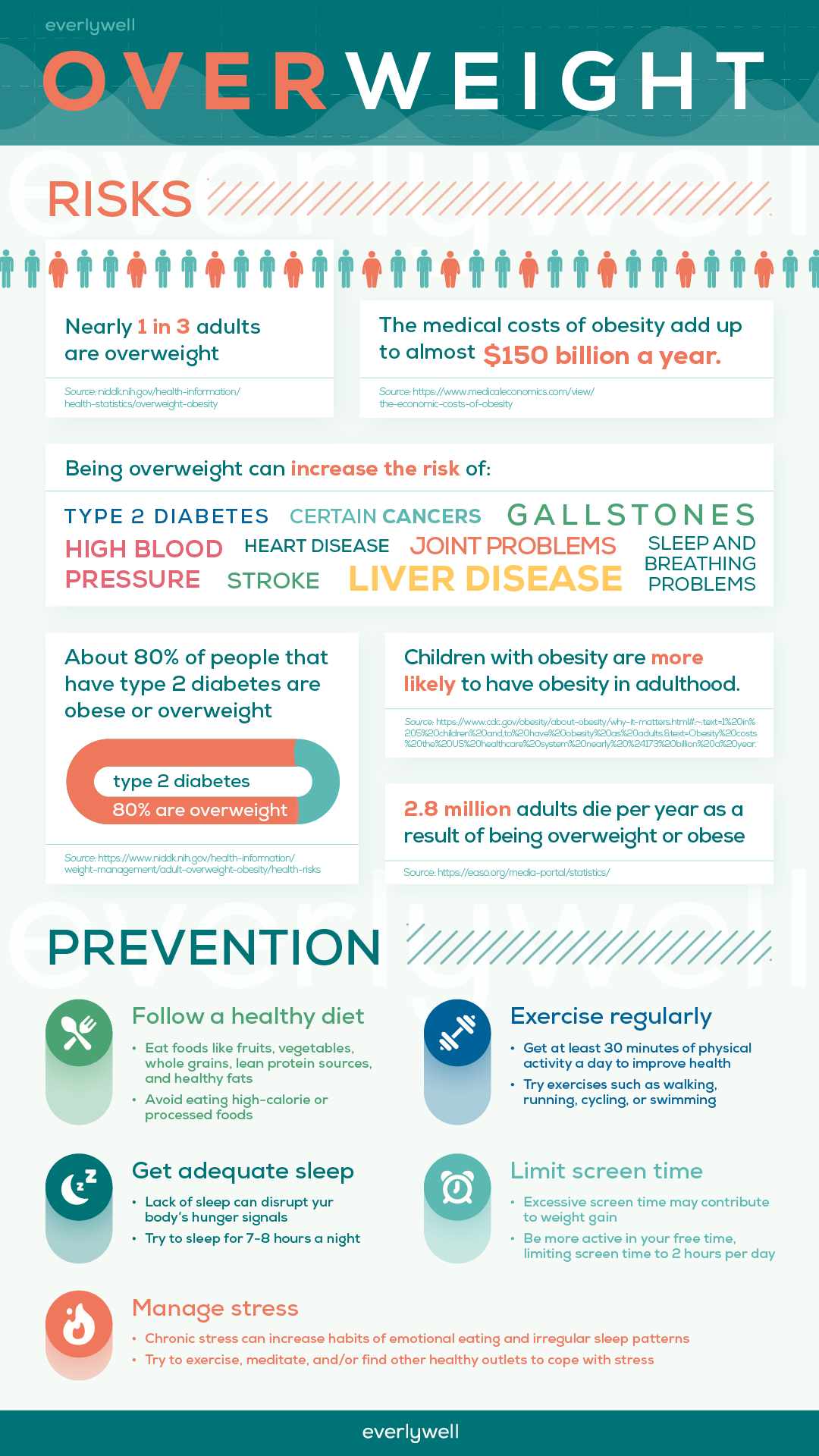
Weight loss and improvement in comorbidity
Written on April 19, 2023 by Sendra Yang, PharmD, MBA. To give you technically accurate, evidence-based information, content published on the Everlywell blog is reviewed by credentialed professionals with expertise in medical and bioscience fields.
Table of contents
- Benefits of healthy weight loss
- What is a comorbidity and why does it matter?
- Weight-related comorbidities
- What simple life changes can you make to help you lose weight?
- A healthy weight can help decrease your risk for weight-related comorbidities
- Related content
Benefits of healthy weight loss
If you are struggling to lose weight, you are not alone. Losing weight can be challenging, but working toward a healthy goal weight is worth it. There are many health benefits associated with a healthy weight loss, including changes not only to your physical appearance but also to your mental health, self-confidence, and overall well-being.[1,2] Weight loss does not have to be overly complicated. Making small lifestyle changes such as eating a healthy, balanced diet and getting regular exercise can make a big difference. These incremental changes will not produce results overnight, but you can achieve a healthy weight with consistent practice, progress, and weight management.
What is a comorbidity and why does it matter?
Before discussing weight-related comorbidities, let’s define comorbidity. Comorbidity is a medical terminology used to describe having two or more distinct health conditions or diseases at the same time.[3] Most of the time, the coexisting conditions are chronic diseases.[3] There are various reasons why a disease may have underlying comorbid conditions, including sharing similar risk factors, having direct causations, or being coincidental and not related at all.[3] It is important to recognize disease comorbidities and how they may affect your health, disease prevention, and treatment.

Weight-related comorbidities
According to the Centers for Disease Control and Prevention (CDC), obesity prevalence in the US was 41.9% from 2017 to 2020, making obesity a common disease in America.[4] Being overweight or obese significantly impacts an individual’s health and the development of chronic comorbid health conditions.[5] Some examples of weight-related comorbid conditions are heart disease, stroke, type 2 diabetes, and certain types of cancers.[4,5] Improvements in comorbidities can be seen with even a weight loss of 5% up to 10% of total body weight.[5,7]
Losing weight can positively impact the following obesity-related comorbidities:
- Diabetes: Obesity is a leading risk factor for developing prediabetes or type 2 diabetes.[6] Losing body weight can help you reduce your risk of developing type 2 diabetes and improve your hemoglobin A1c levels.[7]
- Hypertension: Obesity can result in potentially life-threatening hypertension issues. Obesity accounts for a significant number of primary hypertension cases.[8] According to the American Heart Association, losing a few pounds of excess weight can help you improve your heart health by reducing the strain on your heart.[9]
- High cholesterol: According to the CDC, obesity is associated with increased levels of triglycerides, increased LDL cholesterol, and lower HDL cholesterol.[10] If you have a family history of high cholesterol, are of advanced age, and are overweight, you are at higher risk of developing cardiovascular disease.[10] Eating a balanced diet and getting regular exercise can help you manage your cholesterol and lose weight.
- Non-alcoholic fatty liver disease: Non-alcoholic fatty liver disease is a prevalent obesity comorbidity.[11] The cause of non-alcoholic fatty liver disease is generally excess fat stored in the liver. Weight loss can help reduce fats stored in the liver.[7]
What simple life changes can you make to help you lose weight?
Eating healthy, well-balanced meals that include good sources of protein, fiber, and fats can help you maintain a healthy weight.[12] Not only do whole-grain foods play a role in lowering blood pressure, but new studies have also shown an association with lowering LDL cholesterol levels in obese adults.[14] A diet with healthy proteins enables better appetite control by making you feel fuller and helping to reduce the unnecessary intake of additional calories.[15]
Staying active may help reduce the risk of comorbidities associated with obesity by losing and maintaining a healthy weight.[16] Staying active helps you maintain your weight because physical activity burns calories and reduces body fat. According to the CDC, moderate-intensity aerobic exercise of more than 150 minutes per week can help you maintain a healthy weight.[16] To reach your target weight goal, combining an active lifestyle and a healthy diet can help you keep the weight down.
A healthy weight can help decrease your risk for weight-related comorbidities
Achieving a healthy weight goal to reduce complications associated with other comorbidities is more about the journey than the destination. With dedication and consistency, you can work to see a healthier version of yourself. Weight loss can be a powerful tool to help you reduce your risk of weight-related comorbidities. Even a modest weight loss can make a difference to your total body weight. You can significantly reduce your risk of chronic disease and positively change your health now and in the future.
If you are having weight loss challenges and are concerned about the comorbidities associated with higher body weights, consider talking to a professional healthcare provider to learn how you can best achieve your weight goals. Everlywell provides access to a weight loss telehealth option where you can virtually consult with a certified clinician to discuss your weight loss goals.
Related content
Wegovy® vs. Ozempic®: explaining these medications
Sleep apnea and weight loss: what's the connection?
Is PCOS a comorbidity for weight loss surgery?
References
- Simon GE, Von Korff M, Saunders K, et al. Association between obesity and psychiatric disorders in the US adult population. Arch Gen Psychiatry. 2006;63(7):824-830. doi:10.1001/archpsyc.63.7.824. URL.
- Swencionis C, Wylie-Rosett J, Lent MR, et al. Weight change, psychological well-being, and vitality in adults participating in a cognitive-behavioral weight loss program. Health Psychol. 2013;32(4):439-446. doi:10.1037/a0029186. URL.
- Valderas JM, Starfield B, Sibbald B, Salisbury C, Roland M. Defining comorbidity: implications for understanding health and health services. Ann Fam Med. 2009;7(4):357-363. doi:10.1370/afm.983. URL.
- Adult obesity facts. Centers for Disease Control and Prevention. URL. Published May 17, 2022. Accessed April 6, 2023.
- Lim Y, Boster J. Obesity and comorbid conditions. In: StatPearls [Internet]. Treasure Island (FL): StatPearls Publishing; 2023. URL
- Diabetes risk factors. Centers for Disease Control and Prevention. URL. Published April 5, 2022. Accessed April 6, 2023.
- Ryan DH, Yockey SR. Weight loss and improvement in comorbidity: differences at 5%, 10%, 15%, and over. Curr Obes Rep. 2017;6(2):187-194. doi:10.1007/s13679-017-0262-y. URL.
- Garrison RJ, Kannel WB, Stokes J 3rd, Castelli WP. Incidence and precursors of hypertension in young adults: the Framingham Offspring study. Prev Med. 1987;16(2):235-251. doi:10.1016/0091-7435(87)90087-9. URL.
- Managing weight to control high blood pressure. American Heart Association. URL. Published December 2, 2022. Accessed April 6, 2023.
- Know your risk for high cholesterol. Centers for Disease Control and Prevention. URL. Published March 20, 2023. Accessed April 6, 2023.
- Fabbrini E, Sullivan S, Klein S. Obesity and non-alcoholic fatty liver disease: biochemical, metabolic, and clinical implications. Hepatology. 2010;51(2):679-689. doi:10.1002/hep.23280. URL.
- Healthy eating for a healthy weight. Centers for Disease Control and Prevention. URL. Published March 8, 2023. Accessed April 20, 2023.
- Hollænder PL, Ross AB, Kristensen M. Whole-grain and blood lipid changes in apparently healthy adults: a systematic review and meta-analysis of randomized controlled studies. Am J Clin Nutr. 2015;102(3):556-572. doi:10.3945/ajcn.115.109165. URL.
- Saltzman E, Das SK, Lichtenstein AH, et al. An oat-containing hypocaloric diet reduces systolic blood pressure and improves lipid profile beyond effects of weight loss in men and women. J Nutr. 2001;131(5):1465-1470. doi:10.1093/jn/131.5.1465. URL.
- Westerterp-Plantenga MS, Lemmens SG, Westerterp KR. Dietary protein—its role in satiety, energetics, weight loss and health. Br J Nutr. 2012;108 Suppl 2:S105-S112. doi:10.1017/S0007114512002589. URL.
- Physical activity for a healthy weight. Centers for Disease Control and Prevention. URL. Published June 16, 2022. Accessed April 6, 2023.
